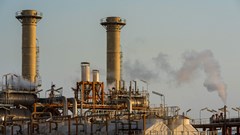Rich Countries Provide No Haven From Climate Doom, Study Finds
(Bloomberg) -- As sovereign debt investors concerned about climate change scrutinize national responses to rising global temperatures, they’re increasingly finding that wealthier nations aren’t doing their part to help address global warming.
Not one country is on track for a 1.5C future based on 2030 national pledges for cutting emissions, according to the Assessing Sovereign Climate-related Opportunities and Risks Project. What’s more, the review of 70 countries’ emissions and policies shows “no overwhelming trend” that wealthier countries are doing a better job of tackling climate change.
Investors need to see more credible action by governments, said Victoria Barron, chief sustainability officer at GIB Asset Management and ASCOR co-chair, in a statement. “Investors play a pivotal role in driving capital” and “these flows require robust and tangible national climate and energy policies,” she said.
Investors largely agree that climate risks aren’t fully priced into markets, and academics are now studying what they’re calling the climate-sovereign debt doom loop to calculate the potential costs to countries.
ASCOR’s findings come at a time when countries also increasingly find themselves the subject of legal threats for allegedly failing to protect their citizens from raging fires and floods. The International Court of Justice will hold hearings next month as it weighs in on the debate.
And prospects aren’t improving in the US, the world’s biggest economy, where President-elect Donald Trump is expected to withdraw from the Paris climate agreement. He also nominated a fracking-company executive to head the Energy Department.
In Europe, corporate pushback is testing policymakers’ commitment to sustainability initiatives, already under attack because of what’s seen as high administrative costs.
ASCOR was created three years ago to help investors measure, monitor and compare how countries are responding to climate change. Costa Rica and Angola stand out for being close to hitting their 1.5C benchmarks, the report said. Meanwhile, less than 20% of countries have committed to halt the approvals of new coal, oil and gas production and more than 80% don’t have transparent and credible commitments to phase out fossil-fuel subsidies.
Financing too is lagging behind. The report’s authors concluded that more than 80% of wealthy countries aren’t contributing their proportional share of an annual $100 billion international climate finance goal, which was increased to $300 billion at the COP29 climate summit in Baku.
Demand for more and consistent information led ASCOR to expand the project’s scope beyond an initial 25 countries to the 70 countries. On the plus side, 40 countries now have in place legal frameworks for addressing climate change and three-fourths have plans for managing physical risks, the researchers said.
©2024 Bloomberg L.P.
KEEPING THE ENERGY INDUSTRY CONNECTED
Subscribe to our newsletter and get the best of Energy Connects directly to your inbox each week.
By subscribing, you agree to the processing of your personal data by dmg events as described in the Privacy Policy.
More gas & LNG news

China May Exempt Some US Goods From Tariffs as Costs Rise

Spain Wants EU to Keep Methane Goals in Search for LNG Supplies

Booming Power Demand Means Longer Wait for GE Vernova Customers

US Widens Sanctions on Iran to Target Lucrative Gas Exports

China Stops Imports of US LNG Amid Trade War, Custom Data Shows

China’s Shipowners Seek to Continue Talks With US on Levies

EU’s Costa Says Russian LNG Phase-Out Makes Room for US Supplies

Fracker Liberty’s Profit Falls to 3-Year Low as Oil Slumps

Uniper and Woodside sign LNG supply agreements
















